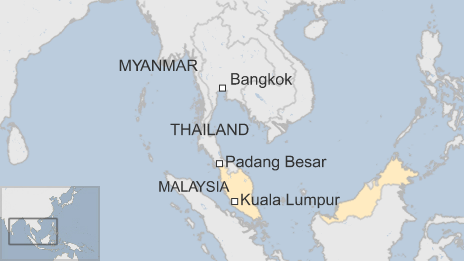Malaysia finds 'migrant' mass graves near Thai border
- Published
Jonathan Head has been investigating Thailand's human trafficking trade for six months
Several mass graves thought to contain bodies of migrants have been found in Malaysia, authorities say.
Home Minister Zahid Hamidi was quoted by Malayia's Star newspaper as saying the graves were found in 17 abandoned trafficking camps near the Thai border.
He did not know how many bodies had been recovered.
Several mass graves have been found in Thailand along a route used to smuggle Rohingya Muslims fleeing persecution in Myanmar (also known as Burma).
But these would be the first discovered in Malaysia.
Thailand has already launched a crackdown on the trafficking networks.

An investigation by the BBC's Jonathan Head has found entire communities in Thailand helping the traffickers.
The Thai trafficking networks, he found, bought boatloads of migrants from other smugglers and held them in the jungle until their families paid a ransom. Many migrants are believed to have perished from disease or starvation.
Every year thousands of people are trafficked through Thailand and into Malaysia.
The latest graves were found near Padang Besar and Wang Kelian in the Malaysian state of Perlis, Malaysian newspaper reports said.
Utusan Malaysia newspaper cited unnamed sources as saying about 30 mass graves had been found containing "hundreds of skeletons".
The Star said the graves were "believed to contain nearly 100 Rohingya migrants".
Thousands of migrants - Rohingyas fleeing persecution in Myanmar and economic migrants from Bangladesh - are stranded in boats in the area.
More than 3,000 have landed in neighbouring Malaysia, Thailand and Indonesia.
Malaysia and Indonesia have begun searching for migrant boats in the past week.
Myanmar also rescued the first boat two days ago.
Malaysia and Indonesia have agreed to stop towing boats out to sea and will provide temporary shelter to those who have landed.
Thailand only said it would stop rejecting boats.


Asia's migrant crisis
Rohingya Muslims mainly live in Myanmar, where they have faced decades of persecution.
Rights groups say migrants feel they have "no choice" but to leave, paying people smugglers to help them.
The UN estimates more than 120,000 Rohingyas have fled in the past three years.
Traffickers usually take the migrants by sea to Thailand then overland to Malaysia.
But Thailand recently began cracking down on the migrant routes, meaning traffickers are using sea routes instead.
